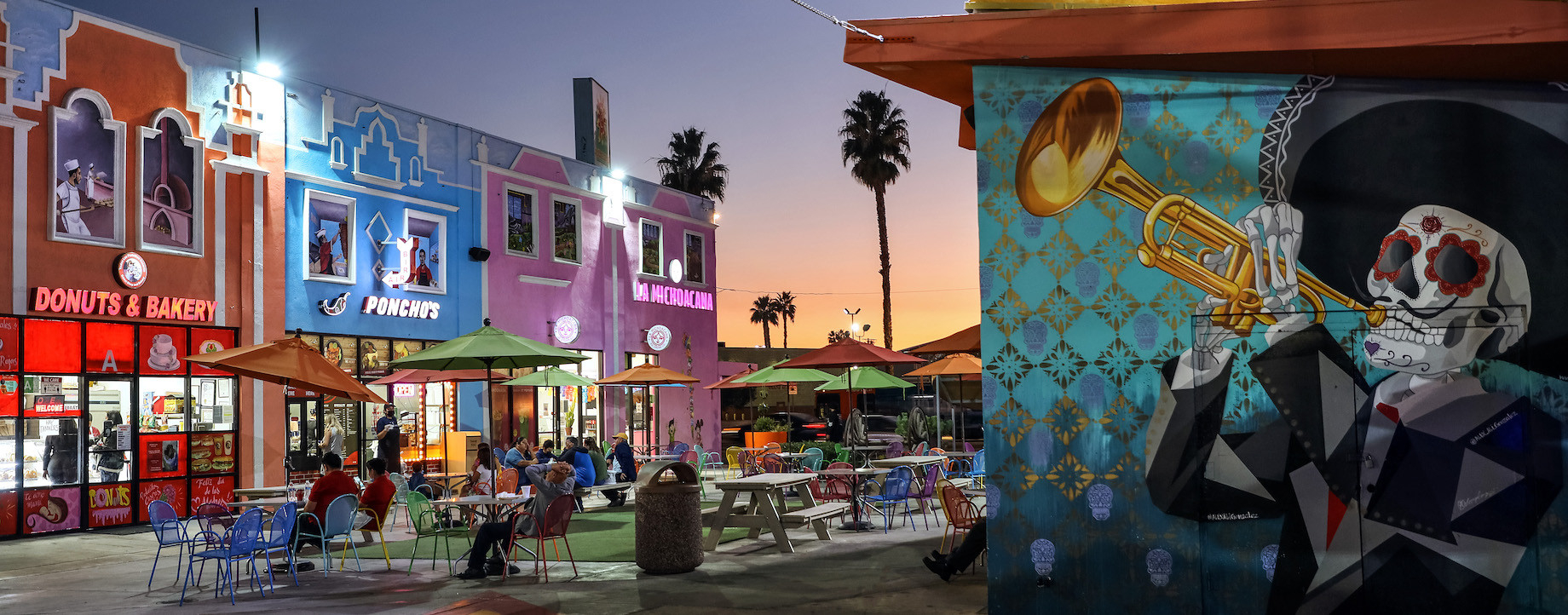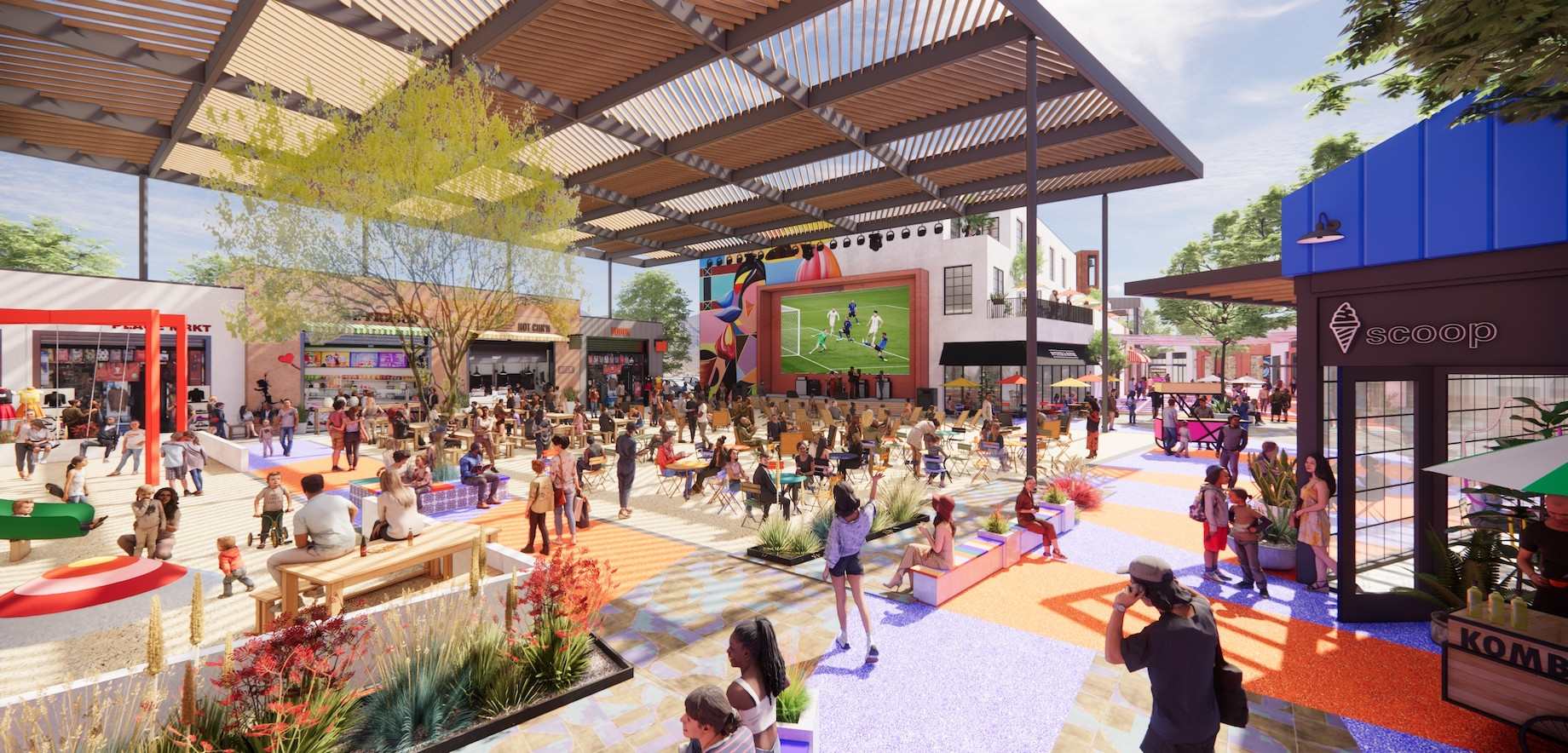The idea for micro-tenants came to Agora Realty and Management CEO Cary Lefton in 1999 when the company developed Plaza del Valle, an open-air lifestyle center in Panorama City, California. Agora envisioned it as a community town center for the entire local region.
“What has always intrigued me was the swap-meet business where you had small retailers operating out of basically parking stalls where there really wasn’t a sense of any type of permanent occupancy and businesses were only open on the weekends,” said Lefton. “We came up with the idea of creating a paseo or walking street and then creating small retail footprints of retail stores and restaurants not greater than 300 to 400 square feet. We also thought that our prospective tenant base might come from these swap-meets where the successful tenants would appreciate having a permanent retail store to operate seven days a week.”
Today, Plaza del Valle is a tourist attraction for the San Fernando Valley. Agora since has set aside such paseo districts at centers it owns and now is using the model in a ground-up mixed-use project in downtown North Las Vegas.

Agora Realty and Management has been grouping 300- to 400-square-foot spaces to startups since it built Plaza del Valle — in Panorama City, California — in 1999, and CEO Cary Lefton says the model has paid financial rewards.
There are a great many advantages to this concept, among them a unique tenant/landlord relationship. “Our job isn’t done after we complete the project and hand the tenant the key,” said Lefton. “It is a continued relationship where the landlord is responsible for programming at the center, making it very community based, and the tenant’s responsibility is to be a good shop owner or great restaurateur and deliver a great product.”
Grouping smaller tenants within a designated area also can be a differentiator. “The high density of retailers is certainly intriguing and a very different retail experience than a center with a lot of national tenants,” he said. “It is atypical of what you would find in well-located real estate in densely populated areas in an urban-infill type of project.”
Micro-tenants also benefit from a center’s marketing, as the critical mass of a consolidated group of like-minded tenants working together makes promotion easier. “It is very community based, so they have an opportunity to create customer loyalty in the neighborhood because you have neighbors buying from neighbors versus just a national chain that is creating a value-oriented product,” said Lefton.
Extra Support
Financing is difficult for start-up and expanding smaller retailers, and Agora provides support. “We found over time that if we can help finance building their stores, there is a higher likelihood of financial sustainability, where the tenant can rely on us to finance a lot of the interior improvements and they can spend their money on payroll and marketing or inventory,” said Lefton.
This is particularly true when it comes to restaurants, which require a large amount of working capital to open. “We certainly have access to resources to be able to expedite the process and ensure that the restaurant gets built,” said Lefton. Agora completes interior improvements like the grease interceptor, washable floors and ceilings and the hood above the cooking equipment. This means the tenant only has to install its cooking equipment, create a menu and get health department approval. That accelerates the store completion by around 12 months. “It benefited both the tenant and landlord to be able to expedite the process and ensure that they stay on budget, and then they can use their precious capital where needed to get their store open,” said Lefton.
Meanwhile, leasing to small businesses requires a different credit-review and tenant-interview process, as most such start-ups don’t have long credit histories or strong balance sheets. “You have good, earnest, hardworking people with a dream,” said Lefton. “We spend more time with the small mom-and-pop tenants: a lot of handholding, a lot of just answering questions through the process and really forcing them to put together a business plan, which we then work through with them to make sure that there is going to be some financial sustainability on the tenant side.”
Agora also had to design lease terms knowing the tenants will take some time to become sustainable rent payers. “Over time, we have developed a little bit more free rent and a ramp-up of base rent so that the lease doesn’t become a financial burden to the new tenant,” he said.
“We have less rollover, more community ownership in our centers and probably better tenant synergy.”
Even with the work required, Agora believes the model is worth it. Lefton said: “There is a limited supply of small retail space available in well-located submarkets and there are a limited amount of landlords that are willing to take on … micro-tenants, so we believe the demand is much higher than the supply.”
Connecting to Community
The micro-tenant program also fosters a strong connection to the local community. “We have really referred to the center as a community-based center because you have local shop owners and you have neighbors buying from neighbors. So we have community programming, such as health fairs once a year, and lots of other programming, as well as a community room,” said Lefton.
The furniture and fixtures in the micro-tenant area at Plaza del Valle is designed to make visitors feel comfortable, and Agora also installed a children’s playground. “We don’t usher people off the property,” Lefton said. “We really wanted to be an extension of the neighborhood and encourage people to come and utilize it and enjoy the public space.”
Agora took what it learned from the Plaza del Valle and redeveloped several grocery-anchored centers it owns. “We have taken some of the obsolete spaces, the old soft goods stores or shoe stores that were in the 8,000- to 10,000-square-foot range, and we have divided them into smaller units and improved them into basically spec restaurant space and then marketed them to smaller restaurateurs. We have had great success doing that.”
The Basis of a New Mixed-Use Project
And now Agora is putting the knowledge gained into practice in a new development. Officials from North Las Vegas who toured Plaza del Valle saw an opportunity to bring the micro-tenant concept to a project they wanted to develop on 29 acres around city hall. “There is no downtown to speak of, so they really loved reimagining all of this vacant land into a downtown district that looked very much like our Panorama City project,” said Lefton. “We had significant success in that downtown corridor redeveloping a shopping center and bringing in national tenants, and there was such a void in this area of North Las Vegas.”

Agora is working on a 29-acre mixed-use development in downtown North Las Vegas that will include about 100 small businesses, as well as national tenants, a children’s playground, a public space with a large screen for programming and community events and activities, a community room and a banquet hall.
In November 2022, Agora started construction on 200,000 square feet of retail and 125,000 square feet of healthcare and medical office space, set for completion in 24 months at a cost of $105 million.
Agora’s success in creating community centers is worth noting for property owners around the country. “The more traditional outlook to commercial center ownership was that financial sustainability was directly related to the balance sheet of a national tenant, but we are finding that there is financial sustainability with creative, local-owned businesses,” said Lefton. “We have less rollover, more community ownership in our centers and probably better tenant synergy. It is a lost opportunity when your marketing team is just focusing on attaining the national tenants. There is a space for them — we certainly need them from a credit standpoint on the rent roll — but there are also financial rewards by carving out some of that space in our centers for local tenants, as well.”
By Ben Johnson
Contributor, Commerce + Communities Today